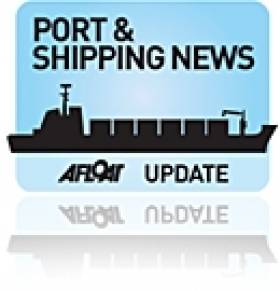Displaying items by tag: AircraftCarrier
Final ‘Invincible’ Aircraft-Carrier HMS Illustrious Retires
#HMSillustrious– HMS Illustrious (RO6), the Royal Navy's sole remaining 'Invincible' class aircraft-carrier was decommissioned in a ceremony at Portsmouth Naval Base yesterday, writes Jehan Ashmore.
She served for more than three-decades as the back-bone of the Royal Navy and in that timeframe she sailed 900,000 miles.
HMS Illustrious last month returned to her homeport of Portsmouth for her final time. Before she berthed in the Hampshire port, she met her successor at sea, HMS Ocean (L12).
As previously reported on Afloat.ie, HMS Ocean had gone for a £65m refit at Devonport Royal Dockyard. The major overhaul sees her take over duties of HMS Illustrious as the UK's on-call combat helicopter-carrier.
Launched in 1978 at Swan Hunter on the Tyne, the 22,000 tonnes HMS Illustrious would later be given her nickname 'Lusty' by her crew members. She made a farewell tour of UK ports last year, among them Liverpool. As the last of the 'Invincible' trio, she followed leadship HMS Invincible and Ark Royal.
The class were made famous for carrying 'Harrier' VSTOL jump jets that proved a vital role in the Falklands Conflict in 1982. In more recent years, the role of HMS Illustrious as an aircraft-carrier was scaled down to that of only carrying helicopters.
As previously reported on Afloat.ie, HMS Illustrious visited Dublin Port in April 2013, this rare call would be the last. Only months later, she undertook an emergency humanitarian relief mission after Typhoon Haiyan struck the Philippines in December.
Both HMS Invincible and HMS Ark Royal were scrapped, the manner in which they were allowed to be disposed by the UK Ministry of Defence has caused critism from the public and there are now calls to save the 'Lusty'.
In June of this year, HMS Illustrious berthed in Rosyth next to the newbuild HMS Queen Elizabeth, the first of a pair of 65,000 displacement tonnes 'QE' class aircraft-carriers. Leadship, HMS Queen Elizabeth was named at the Babcock Marine shipyard by Queen Elizabeth II.
New Passenger-Only Ferry for Northern Ireland-Scotland Route
Plans to operate the first passenger-only ferry service between Northern Ireland and Scotland are scheduled to start in late May, writes Jehan Ashmore.
Kintyre Express is to operate a Ballycastle-Campbeltown service on Fridays, Saturdays and Sundays between 27 May and 26 September. Three daily return trips are scheduled on the service though the 1200hrs sailing from Campeltown and the corresponding 1400hrs sailing from Ballycastle will only operate on customer demand.
The passage time is scheduled to take approximately 1 hour 30 minutes between County Antrim and the Mull of Kintyre which is a distance of some 50 kilometres / 30-miles. Ticket fares for a single journey are £30 and the return is £55. On the remaining days that the route is not operated on, the boat is available for private charter.
In addition the new venture is to include an on-demand Campbeltown-Troon route running between April and September. This second service, linking Argyll with Ayrshire, will operate on Sundays, Wednesdays and Fridays. The journey time is somewhat shorter with a scheduled time of 1 hour 15 minutes. The on-demand service must be booked in advance with singles fares costing £50 and a return ticket at £80. For further information click www.kintyreexpress.com
Like the recent proposals announced for a passenger-only ferry service across Galway Bay click here, the Kintyre Express operation will also use a fast-ferry in the form of rigid inflatable boats (RIB). The two routes from Campeltown will be served by Redbay Stormforce 11 metre RIBS which have centrally heated fully enclosed cabins for about 10 passengers. The Redbay Boats are built in Cushendall, Co. Antrim, for further information about the type of RIB to be used on the new routes click here.
The Ballycastle-Campbeltown route will be unique in that it will be the sole passenger-only ferry operator serving between the island of Ireland and the UK.
When the second route opens between Campbeltown-Troon, the company will be able to provide their boat service linked in with a train journey to Glasgow which they claim can be completed in less than two hours. Trains between Troon and Glasgow Central Station operate every 30 minutes and with a journey time of approximately 40 minutes.
For those who are car-free and time-free, this most northerly of travel routes is arguably the most scenic way to travel between Northern Ireland and Scotland and will appeal also to the intrepid traveler.
On both ferry services bicycles are carried for free and currently there is a special offer with all ferry tickets that can also be used for a free-day pass on the local Kintyre bus network for up to 24-hours. The bus operator is Craig of Campbeltown which trades as West Coast Motors and which owns Kintyre Express. The bus operator also serves on routes throughout Argyll and the island of Bute.
The next nearest cross-channel operator to the Kintyre Express Ballycastle-Campbeltown service is the car-carrying catamaran fast-ferry seasonal service between Larne and Troon operated by P&O (Irish Sea). The same company operates the year-round conventional car-ferry service on the North Channel between Larne and Cairnryan. Also operating to Loch Ryan is Stena Line which operates both ferry and HSS fast-craft services on the Belfast-Stranraer route.
Over the years there have been several attempts to revive the ferry between Ballycastle and Campeltown following a service that catered for vehicles too. For three summer seasons starting in 1997 the service was operated by the Argyll and Antrim Steam Packet Company, using the Claymore (1978/1,632grt) which could accommodate 500 passengers and 50 vehicles.
In 1996 the vessel was chartered to carry out tender duties for visitors and crew of the aircraft-carrier USS John F. Kennedy (displacement 82,655 tons full load) which was at anchor off Dun Laoghaire Harbour.

























































